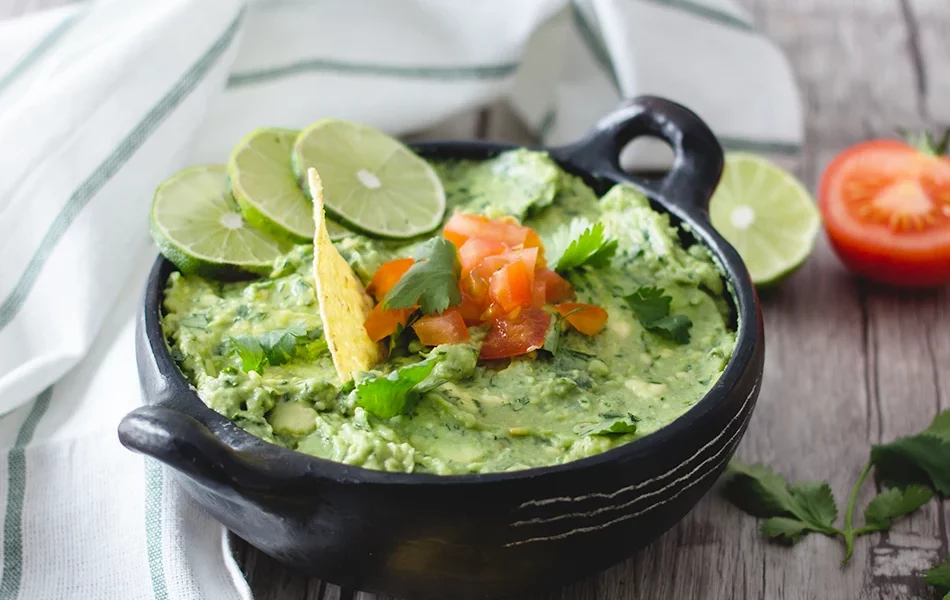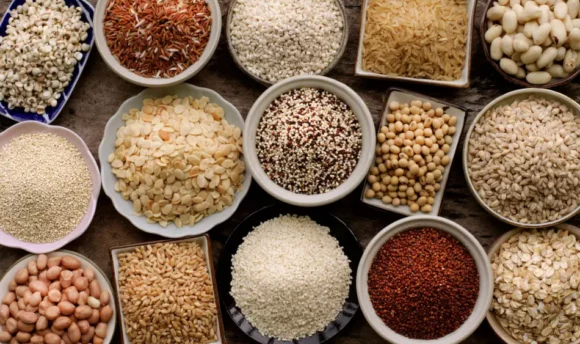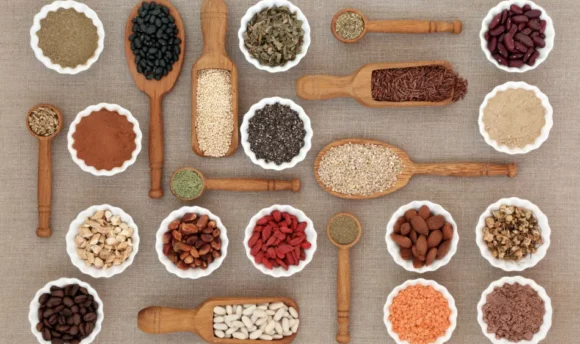Is Guacamole Healthy? Nutrition Facts and Health Benefits
Guacamole is a popular dip that contains fresh avocado, lime, tomatoes, and herbs, but is it healthy?

Sometimes, it’s easy to buy dips at the store when you don’t have the right ingredients. These condiments range from sour cream to ranch dressing, all of which contain sugar and saturated fat. But what about guacamole?
Guacamole, an avocado-based dip, has many fresh ingredients that could benefit your health. You can use it for salads or spread it on some whole-wheat bread to make a delicious lunch. However, many people wonder whether guacamole is actually healthy and serves as a better alternative to other dips.
Discover the health benefits and possible side effects of eating guacamole, along with a homemade guacamole recipe that uses the most nutrient-dense ingredients.
Is Guacamole Healthy?
Yes, guacamole is healthy because it contains nutritious foods such as avocados, tomatoes, garlic, and cilantro. You should make your own version at home to avoid buying products with unnecessary additives.
Most of the health benefits derive from avocado, which is the main ingredient in guacamole. Avocados contain monounsaturated fat, fiber, potassium, and vitamin C, all of which support your immune system and gut. Studies show that unsaturated fat also lowers the risk of heart disease.
Tomatoes and garlic are also good for diabetes because they contain plenty of vitamin C, A, and K. Vitamin C is known to decrease blood glucose in those with type 2 diabetes, making guacamole perfect for your diet.
Guacamole is lower in calories compared to other dips like sour cream and ranch dressing. So, if you’re planning on losing weight or following a clean diet, choose this avocado-based dip instead.
What Is Guacamole?
Guacamole is a dip consisting of mashed avocado, onion, tomatoes, lime juice, jalapeno pepper, and cilantro. The traditional way to consume this dip is to scoop it up with crackers or nacho chips. Some people also like to spread the guacamole on toasted bread.
You can make guacamole by mashing the avocado with a fork and adding the vegetables and herbs afterward. For a less chunky version, throw all of the ingredients in a blender or food processor. Most brands follow the same steps, but they may add more salt and rice starch during processing.
Research suggests that too much salt is bad for your heart. This is because excess sodium increases blood pressure, which encourages fluid to build around your heart and lungs. Therefore, it’s better to make guacamole at home to limit your daily salt consumption.
5 Health Benefits of Guacamole
Guacamole, when made at home, can improve your health. It’s important to use fresh vegetables that haven’t been processed, as you want the dip to contain key nutrients such as monounsaturated fat and potassium.
Below are some health benefits of guacamole:
#1 Improves heart health
A study found that avocados improve long-term heart health. This is because they contain dietary fiber, which is an important nutrient that lowers blood cholesterol. The less plaque build-up in your veins, the better your heart will function.
Tomatoes are another dominant ingredient in guacamole. Lycopene, a chemical present in these small fruits, helps to regulate your blood pressure. Your body doesn’t have to work so hard just to pump blood.
#2 Helps regulate blood sugar
People with diabetes can enjoy guacamole since it improves post-meal blood glucose. Lower blood sugar levels offer more protection for your kidneys, blood vessels, heart, and gut. The healthy fats in avocado also decrease the amount of low-density lipoprotein in your body.
#3 Boosts brain function
Onions can increase your intake of vitamin B-6, also known as pyridoxine. This water-soluble vitamin encourages your body to make more serotonin and dopamine, which are chemicals that support strong brain health.
Limes, being another ingredient in guacamole, protect your brain cells. They contain flavonoids – phytochemicals that prevent neurodegenerative disease. You can also use lemon juice to gain the same health benefits.
#4 Strengthens digestion
Avocados can help replenish your gut by boosting digestive function. Potassium is an electrolyte that stimulates muscle contractions to help your gut break down food. In turn, you won’t suffer from constipation, stomach cramps, or diarrhea due to the lack of nutrients in your intestines.
Consuming more healthy fat, such as monounsaturated fat, can also decrease gut inflammation and flatulence. This ensures you don’t experience persistent abdominal pain, painful constipation, or chronic fatigue.
#5 Protects your vision
Studies show that avocados can protect your eyes in the long term. They contain lutein, which is an antioxidant that slows macular degeneration, cataracts, and other common eye issues such as presbyopia and glaucoma.
Possible Side Effects of Guacamole
There are some downsides to consuming guacamole regularly. Store-bought versions can contain ingredients that don’t react well in your stomach. Therefore, it’s important to follow homemade guacamole recipes.
Common side effects include bloating, diarrhea, and stomach pain due to the high fiber content in avocados. People with food hypersensitivity should also consume guacamole moderately to avoid vomiting.
It’s also possible to buy a dip that contains chili peppers. These types of spicy peppers can trigger heartburn from acid reflux and irritate your gut. Always check the ingredients label before buying guacamole from the supermarket.
Nutrition Facts of Guacamole
Learning about the nutrients in guacamole can help you decide whether it’s a suitable food for your diet. For example, those on a keto diet may want to know how many carbs are in a single serving.
Below are some nutritional facts of guacamole:
Nutritional value (per 100g)
| Calories/Nutrient (per 100g) | Amount |
| Calories (kcal) | 200 |
| Net Carbs (g) | 3.3 |
| Fiber (g) | 6.7 |
| Sugar (g) | 0 |
| Fats (Total) (g) | 16.67 |
| Saturated Fats (g) | 3.33 |
| Calcium (mg) | 0 |
| Protein (g) | 3.33 |
Source: USDA
Low in carbs
Eating too many carbohydrate-rich foods, such as sour cream or salad dressing, is not good for your heart because they increase your blood pressure. However, guacamole is very low in carbs, meaning it won’t encourage LDL cholesterol to build plaque in your blood vessels.
High in monounsaturated fats
Monounsaturated fats are beneficial types of fatty acids that reduce your risk of cardiovascular disease. They remove harmful triglycerides in your blood and maintain the cells that prevent inflammation. You should always consume unsaturated fat rather than saturated fat when protecting your heart.
High in fiber
Avocados contain a high amount of dietary fiber in one serving. Your body needs fiber to poop regularly and promote a healthy gut microbiome. This essential carbohydrate also keeps your blood sugar in check by delaying the release of insulin after consuming a large meal.
Rich in potassium and magnesium
Guacamole is rich in potassium and magnesium. These are important minerals that support your overall health. They can strengthen your muscles, protect your heart, and ensure strong lung function. You need a good balance of these electrolytes to keep every organ functioning properly on a balanced diet.
Rich in vitamins
Guacamole contains a range of essential vitamins and minerals. It has vitamins B, K, and E, as well as 44mg of magnesium, 452mg of potassium, and 78mcg of folate. A study found that vitamin K strengthens your bones while folate supports healthy cell growth.
Tomatoes also have 17.8mg of vitamin C, which is necessary for your immune system.
Homemade Healthy Guacamole Recipe
Buying guacamole at the store may not be the best option since brands tend to add unnecessary sugar and salt. Instead, follow your own recipe, as you can use whatever fresh ingredients suit your diet.
Here is a homemade healthy guacamole recipe to use:
Ingredients
- 5 ripe avocados
- ½ cup sliced red onion
- 1 finely-sliced jalapeno, you can add more
- ⅓ cup fresh chopped cilantro
- 4 tbsp of juice from fresh limes
- 1 tsp kosher salt, optional)
Directions
- Prepare the ingredients by chopping the jalapeno, cilantro, and red onion into small pieces.
- Mash the avocado with a fork. You can leave some chunks in there, depending on your guacamole preferences.
- Now, add the onion, jalapeno, cilantro, fresh lime juice, and salt to the mashed avocado. Stir that together.
- Taste the mixture and add more ingredients if necessary.
- Add additional cilantro to the top of the guacamole and serve. It’s better to consume this dip on the same day.
For more guidance on following healthy recipes, consider investing in nutrition apps. You can search for other meals and low-calorie dips that suit your diet. Apps may also help with your weight loss journey, as they have calorie-tracking features, tips, diet plans, and educational content.
FAQs
No, guacamole is not fattening if you make it at home. Using fresh ingredients ensures you’re not consuming unnecessary additives. Just remember that store-bought products often contain more added sugar and salt.
Guacamole can be just as healthy as avocado, yes. This is because the dip contains other nutrient-dense foods like tomatoes, lime, and onion. You can enjoy guacamole as part of a balanced diet.
There’s no harm in eating guacamole while you’re losing weight. Since it is low in fat, sugar, and net carbs, it won’t slow down your progress. In fact, research suggests that avocados may boost weight loss by decreasing your appetite, which leads to a lower daily calorie intake.
No, guacamole doesn’t have any cholesterol at all, making it perfect for people with high blood pressure. If you are making it at home, try to limit how much salt you add. This is the only ingredient that could make guacamole unhealthy if you use too much.
A Word From a Nutritionist
Guacamole is a nutrient-dense dip that feeds your body plenty of healthy fats, vitamins, and electrolytes. You should choose this condiment over sour cream or ranch dressing because it doesn’t have saturated fat or excess sodium.
One of the best things about guacamole is its versatility. Many people mix it with salads or spread it over pumpernickel bread for added flavor. It’s also worth adding bell peppers, carrots, or garlic to guacamole to gain more nutrients.
If you do prefer buying guacamole from the store, always check the label. Don’t buy any products that contain too much salt, starch, and artificial flavoring. Forming this habit means you’re constantly aware of what you’re feeding your body.
Conclusion
Guacamole is healthy because it contains avocado, onion, lime, and delicious herbs. You can have this dip with nutrient-dense meals, such as salads and wraps, to improve your long-term health. For more guidance on proper eating, speak to a registered dietitian to obtain a personal meal plan.

















































 Select your language:
Select your language: 








